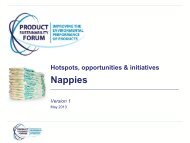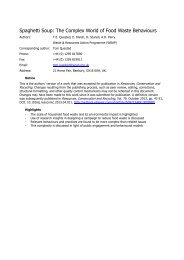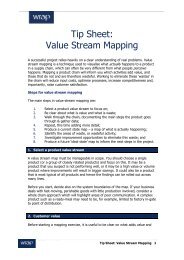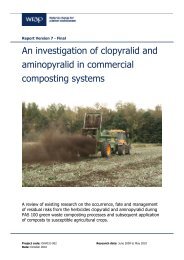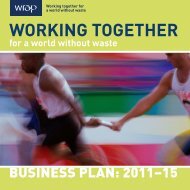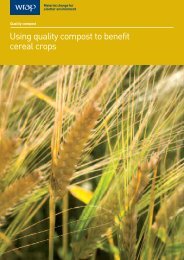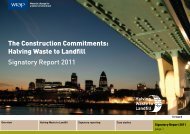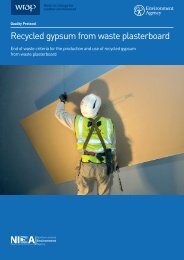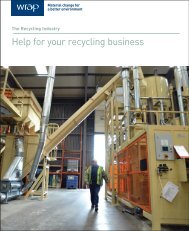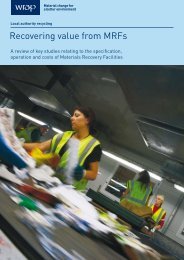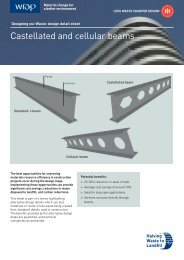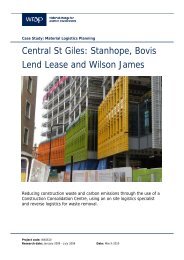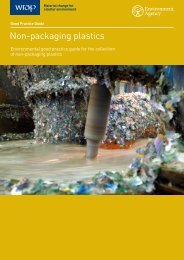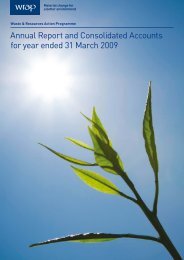Developing a Strategic Approach to Construction Waste
Developing a Strategic Approach to Construction Waste
Developing a Strategic Approach to Construction Waste
Create successful ePaper yourself
Turn your PDF publications into a flip-book with our unique Google optimized e-Paper software.
Restricted – CommercialAEA/ ED02414/Issue 1<strong>Developing</strong> A <strong>Strategic</strong> <strong>Approach</strong> <strong>to</strong> <strong>Construction</strong> <strong>Waste</strong>One of the main aims of the Landfill Tax is <strong>to</strong> encourage more recycling by making it moreeconomically favourable over sending waste <strong>to</strong> landfill. However, this is not always the case,particularly in rural areas, as the costs of transporting waste <strong>to</strong> recycling can often make land filling thecheaper option.“The legislations mean they have a lot more work <strong>to</strong> do and costs of recycling frequently mean that it ischeaper <strong>to</strong> send waste <strong>to</strong> landfill than it is <strong>to</strong> recycle e.g. in rural areas. This is due <strong>to</strong> the costsassociated with transporting the waste <strong>to</strong> the recycling point. With transport making up 70% of wastedisposal costs, recycling depots need <strong>to</strong> be made as accessible as landfill access”Alfred McAlpine, Lucinda Farring<strong>to</strong>n (Environmental manager)OverlapsThis legislation has a similar concept <strong>to</strong> the Aggregates Levy, as both use a system of charges <strong>to</strong>encourage more sustainable use of products. EPA Part 2a, remediation of contaminated land, isexempt from this tax.OpportunitiesBy reducing the amount of waste that is sent <strong>to</strong> landfill, the construction industry stands <strong>to</strong> savemoney. This legislation forces the industry <strong>to</strong> consider how much waste they are generating, which inturn could make them think about reviewing their purchasing strategies <strong>to</strong> look for areas where wastecan be minimised.This encourages the industry <strong>to</strong> look at more sustainable waste management options, such asrecycling and composting. This is because under this legislation, if waste is processed in a way whichfundamentally changes its properties, (e.g. by composting), it will no longer be liable for the tax.Some of this landfill tax goes <strong>to</strong> charity.Planning Policy Statement 10: Planning for Sustainable <strong>Waste</strong> ManagementSummaryPlanning Policy Statement 10 (PPS10) is Government policy on how waste should be managed usingthe land-use planning system. It sets out policy for all waste planning bodies, at both regional andlocal level, in England.PPS10 affects:• Plan makers at all levels, and the stakeholders they consult and work with when formulating wastemanagement strategies and plans.• <strong>Waste</strong> management companies who need <strong>to</strong> apply for planning permission for waste managementfacilities.• Authorities responsible for pollution control.• Everyone in the community, as producers of waste in their own right, and as consumers of goodsand services that rely on processes which themselves generate waste.ImplicationsPPS10 promotes the principle of “driving waste management up the hierarchy” which means thatwaste planning authorities should always try <strong>to</strong> ensure that waste is managed by the best possibleenvironmental means, represented by the highest levels of the hierarchy i.e. waste reduction, re-useand recycling. Therefore this puts further emphasis on the need for the construction industry <strong>to</strong> bereusing and recycling as much as possible.This will also impact on waste management companies, who need <strong>to</strong> apply for planning permission forwaste management facilities. This could mean it takes longer for them <strong>to</strong> get up and running.OverlapsThere were no specific overlaps identified.10 AEA Energy & Environment



